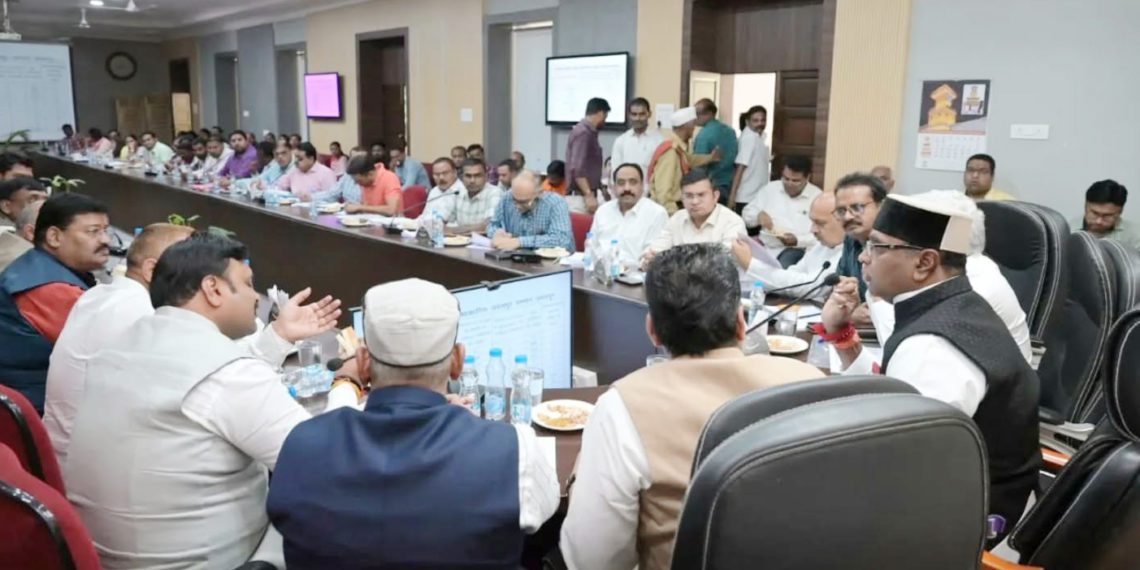The cooperative sector will play a crucial role in achieving the vision of a developed India, stated Madhya Pradesh’s Minister of Cooperation and Youth Welfare, Vishwas Kailash Sarang. Addressing a joint meeting of public representatives and officials at the Collector’s office at Jabalpur, he emphasized the importance of strengthening Primary Agricultural Credit Societies (PACS) to empower the cooperative movement.
The review meeting focused on strengthening district cooperative banks and PACS, procurement of wheat and paddy at minimum support prices, payment to farmers, distribution of fertilizers, and loan recovery. Suggestions were invited from public representatives to enhance the cooperative sector.
The meeting was attended by Member of Parliament Ashish Dubey, MLAs Ashok Rohani, Sushil Kumar Tiwari Indu, Dr. Abhilash Pandey, Neeraj Singh Thakur, Vinod Gontia, Rajkumar Patel, Ratnesh Sonkar, Kamlesh Agrawal, and Rajmani Patel. Also present were Collector Deepak Saxena, Cooperative Commissioner Manoj Pushp, CEO of District Panchayat Abhishek Gehlot, Joint Director Ambrish Vaidya, and senior officials from cooperative departments in the Jabalpur division.
Minister Sarang announced that the state is adopting the Cooperative, Public, and Private Partnership (CPPP) model under Chief Minister Mohan Yadav’s leadership to integrate cooperatives with corporate initiatives. He revealed that recent agreements worth over ?2,305 crore were signed with companies like Reliance, Baidyanath, and Patanjali at the Global Investor Summit in Bhopal. The CPPP model is expected to transform the cooperative sector, boost farmers’ financial stability, and enhance the rural economy.
He stressed that the cooperative sector would no longer follow outdated practices. A zero-tolerance policy against corruption and irregularities will be enforced, with strict action against violators. Efforts are underway to increase transparency, with full digitization of cooperative societies. Madhya Pradesh currently leads the country in digitizing cooperative societies.


To strengthen district cooperative banks and PACS, a plan for loan recovery camps was discussed. The minister directed that revenue department officials be involved in recovery efforts. He also emphasized identifying financially struggling primary agricultural cooperative societies and ensuring that local representatives are informed about recovery efforts.
Sarang urged public representatives to motivate farmers to repay cooperative bank loans, highlighting that timely repayments benefit the farmers themselves. He proposed holding PACS meetings similar to gram sabhas, where member farmers can openly discuss their expectations and grievances.
MP Ashish Dubey stressed the need for a well-organized system for timely fertilizer distribution. Indu Tiwari called for a detailed discussion on improving the financial condition of cooperative societies.
MLA Neeraj Singh recommended strict loan recovery measures for large defaulters and action against officials involved in irregular lending practices. Dr. Abhilash Pandey raised concerns about loan recovery notices being issued for housing loans provided by the State Housing Corporation to victims of the 1997 earthquake.
This high-level review meeting reaffirmed the government’s commitment to revitalizing the cooperative sector, ensuring transparency, and integrating modern business strategies for sustainable rural development.













































